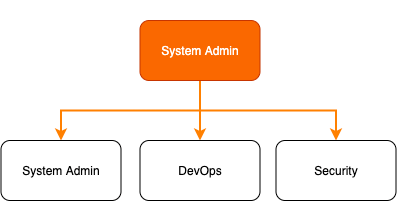
Learning Pathways Overview
This page shows WebsiteLibrary learning pathways in a broad, diagrammatic form. Five main areas are represented. Beginners, Web Development, System Admin, Marketing and Management.
As information technology is constantly evolving and adopting more and more specialised areas, it can make it difficult to pigeonhole each role. To add, depending on the size of the company will determine how specific roles are assigned. For example, a small company of 1 - 10 people may find themselves taking on many IT roles per employee compared to a larger company that will be more specialised.
Hopefully what you will take away from the diagram below is a general sense of what areas of learning WebsiteLibrary covers.
Beginners New to Computing - Improving Basic Computer Skills
The first section in learning pathways is meant for individuals new to computing in general. However, this may also include someone with pre-existing experience wanting to learn more basic skills that are removed from their current skillset.
Relevant Website Sections

Carving a Pathway to Further Learning and Career Aspirations
The pathways map below shows a broad map of the types of web-related learning material that Website Library covers. While most information technology jobs and pursuits could be considered "technical" in nature, two main pathways are shown here to separate the more managerial and marketing endeavours from traditional computing roles that require programming or "high tech" skills.
Technical

Web Development

Web Development has evolved over the years into many specialised roles. However, the area can be broadly categorised into two main streams, front-end development and back-end development. Front-end development relating to the front-facing user interface the user sees when visiting a website or using an app. Back-end development relating more to the background programmatic aspects of an application usually connecting to a database for storage.
Typical Career Positions:
Relevant Website Sections
System Admin

There has been a lot of aspects of technical computing lumped under the System Admin section. The term is very broad and not exactly representative of all the roles found here. However, for ease of classification roles like Networking and DevOps can be found here because of their close association.
Typical Career Positions
Relevant Website Sections
Marketing & Management

Management

The Management section mainly relates to the organisational aspects of online projects. This may take the form of a business contracting a company to build a website (or app) through to the more detailed analysis and planning of a project. So here, there is some crossover with the technical pathway. The main focus is the top end management in a top-down organisational structure and all the players that come into focus in that arena.
Typical Career Positions:
Relevant Website Sections
Digital Marketing

This section covers the fast-growing field of online digital marketing. This area is taking on various specialised roles such as social media marketing, search engine optimisation, email marketing, data analytics and more. Online advertising is a big business making learning skills in this area a very lucrative proposition for aspiring students. Having a technical background can assist avenues like search engine optimisation but mostly not essential. A flair for marketing and general computer skills can often be enough if a starting point.
Typical Career Positions:
Relevant Website Sections
 Crossover with technical pathway
Crossover with technical pathway
Learning Resources (sponsored)
- Alison IT Courses - Free IT Courses with Certification.
- Udemy - Choose from 155,000 online video courses.
- Pluralsight - Learn IT ops, AI and machine learning, security...
Useful Resources Mapping Out IT Pathways
Roadmap.sh - Detailed Diagrams of Modern IT Learning and Career Paths
A website worth having a look at is roadmap.sh. They have taken the time to map out diagrams showing IT pathways in detail. These only relate to the technical pathways as listed above. So if you are development orientated, do check out what they have created.
The topics covered on roadmap.sh currently includes Front-end Development, Back-end Development, DevOps, Android, PostgreSQL DBA and React.

Front-end Development Roadmap
This is the main front-end development roadmap. Main items include the Internet, HTML, CSS, JavaScript, Version Control Systems, Repo hosting services, Web Security, Package Managers, CSS Architecture, CSS, Preprocessors, Build Tools, Linters and Formatters, Task Runners, CSS Frameworks, App Testing, Progressive Web Apps, Type Checkers, Server Side Rendering and a whole heap more.
See full front-end development roadmap
Back-end Development Roadmap
This is the main back-end development roadmap. Main items include Basic Front-end Knowledge, OS and General Knowledge, Back-end languages such as Java, C#, Python, PHP, Version Control, Relational Databases, NoSQL Databases, Caching, Web Security, Testing, CI/CD, Search Engines, GraphQL, WebSockets, Web Servers and more.
See full back-end development roadmap
DevOps Roadmap
This is the main devops roadmap. Main items include Learning Programming Languages, Learning about Managing Servers, Operating Systems, Learning to Live the Terminal, Reverse Proxies, Caching Servers, Load Balancing, Web Servers, Infrastructure as a Code, Containers, Container Management, Container Orchestration, Infrastructure Provisioning, Infrastructure Monitoring, Application Monitoring, Logs Management, Cloud Providers, Cloud Design Patterns and more.
Digital Marketing Career Pathways
This article "What is the Digital Marketing Career Progression?" is worth reading if you are looking at building a career in digital marketing. Possibly you may be transitioning from a more traditional side of marketing into the digital landscape.
While there are no fancy diagrams this article does explore some of the following topics:
Starting digital marketing without the fundamental marketing knowledge that well-seasoned marketing professionals have. Hiring staff vs being an independent contractor. Starting out with a digital marketing career path. Carving out a career in social media. Becoming a content creator with a potential background in journalism. Choosing to be a digital marketing consultant. Taking the search engine optimisation (SEO) career path. Digital marketing using pay per click (PPC). Conversion Rate Optimization (CRO) career path. Affiliate marketing. Lastly a look at salary and earning in the field.
